Certified Global Research Member

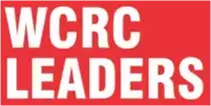
Key Questions Answered
- Global Market Outlook
- In-depth analysis of global and regional trends
- Analyze and identify the major players in the market, their market share, key developments, etc.
- To understand the capability of the major players based on products offered, financials, and strategies.
- Identify disrupting products, companies, and trends.
- To identify opportunities in the market.
- Analyze the key challenges in the market.
- Analyze the regional penetration of players, products, and services in the market.
- Comparison of major players’ financial performance.
- Evaluate strategies adopted by major players.
- Recommendations
Why Choose Market Research Future?
- Vigorous research methodologies for specific market.
- Knowledge partners across the globe
- Large network of partner consultants.
- Ever-increasing/ Escalating data base with quarterly monitoring of various markets
- Trusted by fortune 500 companies/startups/ universities/organizations
- Large database of 5000+ markets reports.
- Effective and prompt pre- and post-sales support.
The market for Crohn's disease is rising thanks to the increasing number of people learning about the disease, which is a long-term inflammation illness affecting the digestive system. The complicated nature of the disease changes the way the market works, which increases the need for effective treatment choices.
Immunomodulatory treatments for Crohn's disease make up a big part of the market. Biologics, like anti-TNF drugs and newly focused therapies, are a big part of treatment and have an effect on both market trends and patient results.
Immunology and gastroenterology are becoming more and more studied, which helps find new treatment targets. The search for new routes and processes in Crohn's disease changes the way the market works and leads to the creation of new treatment choices.
There is competition in the biotech and copycat markets, which changes how the markets work. Biosimilar options to well-known biologics affect how easy and cheap it is to get these drugs, which makes the market more competitive.
The market is moving toward specialized treatment and dividing patients into groups. Customizing medicines for each patient based on genes and disease-related information affects choices about treatments and changes the way the market works.
An increase in clinical studies and study projects helps the market grow. Clinical studies and experimental medicines have an effect on the creation of new treatment choices, which changes market trends and increases the number of treatments available.
Different types of treatments, such as pills and injections, make the market move in different ways. A patient's tastes, concerns about effectiveness, and the changing nature of drug delivery all affect market options and patients' ability to stick to their treatments.
The search for disease-modifying methods has a big effect on the market. Therapies that aim to change the course of Crohn's disease and achieve long-term relief change the market and lead to the creation of game-changing treatments.
Increasing efforts to educate and raise knowledge about patients are also good for the global business. Patients who are well-informed are involved in choosing their own treatments, which affects therapy choices and affects market trends.
When healthcare workers follow treatment standards and agreement comments, it changes the way the market works. Standardized ways of treating Crohn's disease change how treatments are used, which in turn changes how often certain medicines are used.
The impact of inflammatory gut illnesses, like Crohn's disease, on the world economy affects how markets work. Trying to deal with the fact that IBD is becoming more common helps the market grow, which makes more treatment choices available around the world.
Covered Aspects:
| Report Attribute/Metric | Details |
|---|---|
| Segment Outlook | Type, Treatment, End-User and Region |
Crohns Disease Market Highlights:
Global Crohn’s Disease Market Overview
The Crohn’s Disease market size was valued at USD 11.1 billion in 2022 and is projected to grow from USD 11.5 Billion in 2023 to USD 15.37 billion by 2032, exhibiting a compound annual growth rate (CAGR) of 3.7% during the forecast period (2023 - 2032). One of the main market driver fueling the market's expansion is the increasing prevalence of Crohn's disease as a result of changes in people's lifestyles. Governments worldwide have made major investments in creating a medical infrastructure that will offer better facilities for the treatment of the disease and help the economy flourish.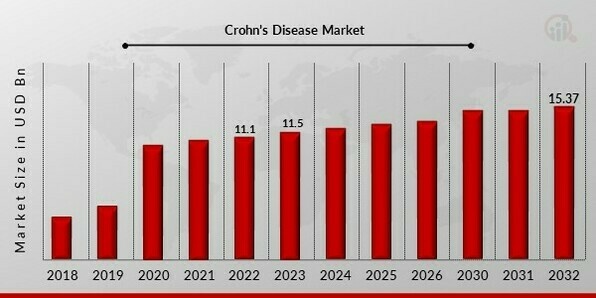
Source: Secondary Research, Primary Research, MRFR Database and Analyst Review
Inflammatory bowel disease (IBD), which includes Crohn's disease, is a chronic inflammatory illness of the gastrointestinal system that irritates the digestive tract. The illness affects only the ileum and colon of the small intestine. The illness can occasionally cause life-threatening consequences and is frequently very painful and incapacitating. A chronic inflammatory disorder of the gastrointestinal system that causes aggravation in the digestive tract is known as inflammatory bowel disease (IBD), and Crohn's disease is one type of IBD. The illness affects only the ileum and colon of the small intestine. The illness can occasionally cause life-threatening consequences and is frequently very painful and incapacitating. These difficulties could be caused by a single factor or a combination of factors, such as intestinal obstruction, anal fissures, colon cancer, fistulas, ulcers, and other medical conditions. Stress, food, inheritance, and immune system dysfunction are only a few causes of Crohn's disease. Any age can get the illness. However, most people are likely to start developing at a young age.
Patients with IBD have a higher prevalence of chronic illnesses than those without IBD, including cancer, rheumatoid arthritis, migraines, and other disorders of the heart, lungs, kidneys, and liver. The market under study is anticipated to have strong development potential due to increased regulatory body attempts to create novel treatment alternatives and growing public awareness of Crohn's disease. Because they are more effective than immunosuppressants and analgesics, anti-inflammatory drugs have maintained their position as the market's largest sub-segment in the therapeutics category. Non-steroidal anti-inflammatory medications (NSAIDs) fall under a distinct category of anti-inflammatory drugs. The most popular medications for Crohn's disease are NSAIDs.
A group of researchers from the Ann & Robert H. Lurie Children's Hospital in Chicago looked to newborn mesenchymal stem cells produced from the heart to find an alternative innovative cell therapy strategy. The group implanted the cells into perforations in the small intestine of the mouse model of ileitis like Crohn's disease using neonatal mesenchymal stem cells (nMSC) derived from discarded heart tissue. Before the study, inflammatory intestinal illness models had not been investigated, and cardiac-derived nMSCs had only been investigated in myocardial infarction models.
Crohn’s Disease Market Trends
- Rising prevalence of inflammatory bowel disorder (IBD) to propel market growth
Inflammation and irritation of the digestive tract are symptoms of Crohn's disease, a kind of Inflammatory Bowel Disease (IBD). While this condition can affect any section of the gastrointestinal tract, including the mouth and the stomach, it most frequently affects the small intestine and colon. The market for Crohn's disease is anticipated to expand rapidly due to factors including the rise in inflammatory bowel disorders (IBD) and the number of Crohn's disease patients. For instance, a disease-death model based on data available was constructed to forecast the future prevalence of IBD in Asia, and Iran in particular, from 2017 to 2035, according to an article published by the Journal BMC Gastroenterology in May 2021. The study predicted a 2.5-fold increase in prevalence for Iran with 69 thousand cases in 2035 compared to 2020, a 2.3-fold increase for North Africa and the Middle East with 220 thousand cases, a quadrupling of the prevalence for India with 2.2 million cases, a 1.5-fold increase for East Asia region with 4.5 million cases, and a 1.6-fold increase for high-income Asia-Pacific and Southeast Asia regions with 183 and 199 thousand cases, respectively. Thus, this factor is driving the market CAGR for Crohn’s disease.
Figure 1: IBD, Crohn’s Disease and Ulcerative Colitis Prevalence Rate in Brazil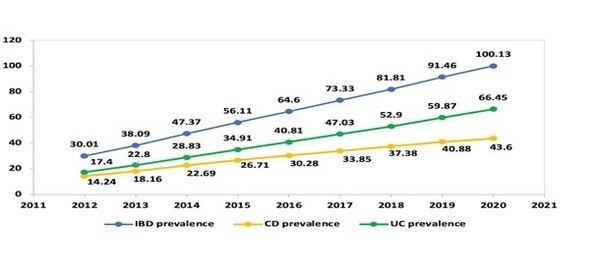
Source: Secondary Research, Primary Research, MRFR Database and Analyst Review
However, another important element driving the market growth of the Crohn's disease is the creation of innovative and potent treatment options to treat the illness's symptoms. For instance, at the Crohn's & Colitis Congress held in January 2018, researchers from the University of Washington Medicine presented a study that produced an antibiotic that demonstrated a four-fold better response to the inflammation of the intestine among patients with Crohn's disease as compared to the currently available therapies. Thus, it is anticipated that this aspect will accelerate Crohn’s disease market revenue globally.
Crohn’s Disease Market Segment Insights:
Crohn’s Disease Type Insights
The Market segmentation of Crohn’s Disease, based on type, includes ileocolitis, ileitis, granulomatous colitis, gastroduodenal crohn’s disease, jejunoileitis and perianal crohn’s disease. The ileocolitis segment held the majority share in 2022 in the Crohn’s Disease Market data. The most prevalent form of Crohn's disease is ileocolitis. The small intestine's last segment and a section of the large intestine become inflamed as a result. It belongs to a class of illnesses known as inflammatory bowel disease (IBD) and is a lifelong chronic ailment that is currently incurable..
Crohn’s Disease Treatment Insights
The Crohn’s Disease Market segmentation, based on treatment, includes non-surgical and surgical. The surgery segment dominated the market growth for Crohn’s disease in 2022 and is projected to be the faster-growing segment during the forecast period, 2022-2030. The most popular types of treatment are non-surgical ones because they are less expensive and invasive. TNF inhibitors and the immune system suppressor medication class are among the most popular non-surgical treatments. With significant innovation in drug technology, the market for these types of medications will probably grow much more.
Figure 2: Crohn’s Disease Market, by Treatment, 2022 & 2030 (USD Billion)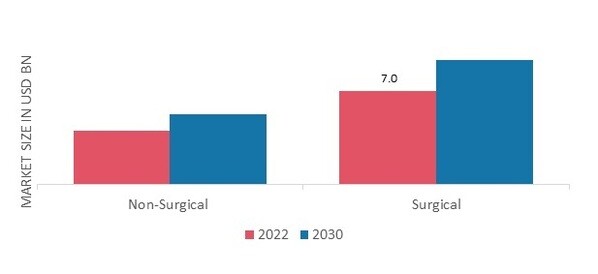
Source: Secondary Research, Primary Research, MRFR Database and Analyst Review
Crohn’s Disease End-User Insights
The Market data for Crohn’s Disease, based on end-user, includes hospitals & clinics and research institutes. The hospitals & clinics segment dominated the market revenue for Crohn’s disease in 2022 and is projected to be the faster-growing segment during the forecast period, 2022-2030 because of factors like a sizable patient population and the existence of units specifically designed to diagnose and treat inflammatory bowel disease A growing number of people with Crohn's disease and awareness of the condition's treatment are other contributing factors to the expansion of this category.
News
For people with moderately to highly active Crohn's disease who have experienced an insufficient response to or intolerance to several tumor necrosis factor blockers, the FDA has approved Rinvoq (upadacitinib). The first licensed oral medication for managing medium to severely active Crohn's disease is called Rinvoq. For the first 12 weeks, patients should begin with 45 mg of Rinvoq once daily. After the 12-week term, the suggested maintenance dosage is 15 mg, administered once a day. For individuals with resistant, severe, or widespread Crohn's disease, a maintenance dose of 30 mg per day may be considered.
Crohn’s Disease Regional Insights
By region, the study provides the market insights for Crohn’s disease into North America, Europe, Asia-Pacific and Rest of the World. North America Crohn’s disease market accounted for USD 5.1 billion in 2022 with a share of around 45.80% and is expected to exhibit a significant CAGR growth during the study period due to rising rates of Crohn's disease and increased awareness of the various therapies. According to CDC data, about 3 million people in the USA alone have been diagnosed with Crohn's disease. A sizable share of the patient population is from Canada. Better medical literacy and a more developed healthcare infrastructure are factors in this region's market expansion.
Further, the major countries studied in the market report for Crohn’s disease are: The U.S, Canada, Germany, France, UK, Italy, Spain, China, Japan, India, Australia, South Korea, and Brazil.
Figure 3: CROHN’S DISEASE MARKET SHARE BY REGION 2022 (%)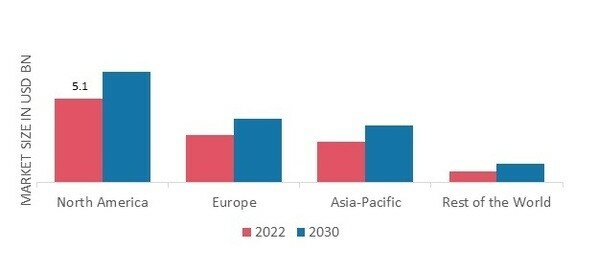
Source: Secondary Research, Primary Research, MRFR Database and Analyst Review
Europe Crohn’s disease market accounts for the second-largest market share as more patients are given this diagnosis and look for available treatments. The chief causes of the disease are currently thought to be dietary patterns and sedentary lifestyles. However, good medical research, availability of better drugs and treatment therapies are helping in market expansion in this region. Further, the UK market for Crohn’s disease held the largest market share, and the Germany market of Crohn’s disease was the fastest growing market in the region.
Asia Pacific market for Crohn’s disease is expected to grow at the fastest CAGR from 2022 to 2030 due to patients' and their families' rising knowledge of the therapies that are available, as well as the expanding economies of nations like China and India. By 2035, it is anticipated that the prevalence of this disease would have quadrupled in this area. In order to treat the increasing number of patients, it will be advantageous to invest in bolstering the health care infrastructure. Moreover, China market of Crohn’s disease held the largest market share, and the India market of Crohn’s disease was the fastest growing market in the region.
Crohn’s Disease Key Market Players & Competitive Insights
Major market players are spending a lot of money on R&D to increase their product lines, which will help the market growth of Crohn’s disease even more. Market participants are also taking a range of strategic initiatives to grow their worldwide footprint, with key market developments such as new product launches, contractual agreements, mergers and acquisitions, increased investments, and collaboration with other organizations. Competitors in the Crohn’s disease industry must offer cost-effective items to expand and survive in an increasingly competitive and rising market environment.
One of the primary business strategies adopted by manufacturers in the global Crohn’s disease industry to benefit clients and expand the market sector is to manufacture locally to reduce operating costs. In recent years, Crohn’s disease industry has provided medicine with some of the most significant benefits. The Crohn’s disease market major player such as Johnson & Johnson Services Inc, Pfizer Inc, Allergan, AbbVie Inc, Bayer AG, Amgen Inc and Takeda Pharmaceutical Company Limited.
Founded in 2013, the American biopharmaceutical business AbbVie is publicly traded. It began as an Abbott Laboratories spin-off. A biopharmaceutical firm, which AbbVie founded, combines the focus and culture of a biotech with the stability, global reach, resources, and commercial capabilities of a pharmaceutical company. Its goal is to find and distribute cutting-edge medications and technologies that improve people's lives now, address medical problems of the future, and address critical health crises. In June 2022, as the first and only selective interleukin-23 (IL-23) inhibitor for the treatment of people with moderately to highly active Crohn's disease, AbbVie Inc., a biopharmaceutical company, announced that the FDA had authorised SKYRIZI (risankizumab-rzaa) (CD).
Also, an international pharmaceutical firm with some American and British heritage, The Takeda Pharmaceutical Company Limited is based in Japan. It is among the top 20 pharmaceutical firms in the world by revenue and is the largest pharmaceutical company in Asia (top 10 following its merger with Shire). The corporation has around 49,578 people worldwide, and its sales for the 2018 fiscal year was US$19,299 billion. Oncology, uncommon illnesses, neuroscience, gastrointestinal, plasma-derived medicines, and vaccines are the company's main areas of interest. Its corporate office is at Nihonbashi, Chuo, Tokyo, while its main office is in Chuo-ku, Osaka. In April 2022, to broaden an existing agreement to cover the discovery and creation of brand-new therapies for fibrostenotic inflammatory bowel diseases, including Crohn's disease, Engitix and Takeda worked together.
Key Companies in the Crohn’s disease market includes
- Johnson & Johnson Services Inc
- Pfizer Inc
- Allergan
- AbbVie Inc
- Bayer AG
- Amgen Inc
- Takeda Pharmaceutical Company Limited
Crohn’s Disease Industry Developments
April 2022:The Crohn's and Colitis Foundation provided project funding to Microbiotica as a part of its inflammatory bowel disease ventures programme for the creation of inflammatory bowel disease treatments.
March 2022:Foralumab (TZLS-401), a monoclonal antibody (mAb), was being tested in a Phase Ib clinical trial by the biotechnology company Tiziana Life Sciences on people with mild-to-moderate Crohn's disease (CD).
May 2021:The US Food and Drug Administration has given the green light to Bristol Myers Squibb's Zeposia® (ozanimod), an oral medication for adults with moderately to severely active ulcerative colitis.
Crohn’s Disease Market Segmentation:
Crohn’s Disease Type Outlook
- Ileocolitis
- Ileitis
- Granulomatous colitis
- Gastroduodenal Crohn’s Disease
- Jejunoileitis
- Perianal Crohn’s Disease
Crohn’s Disease Treatment Outlook
- Non-Surgical
- Surgical
Crohn’s Disease End-User Outlook
- Hospitals and Clinics
- Research Institutes
Crohn’s Disease Regional Outlook
- North America
- US
- Canada
- Europe
- Germany
- France
- UK
- Italy
- Spain
- Rest of Europe
- Asia-Pacific
- China
- Japan
- India
- Australia
- South Korea
- Australia
- Rest of Asia-Pacific
- Rest of the World
- Middle East
- Africa
- Latin America
Leading companies partner with us for data-driven Insights
Kindly complete the form below to receive a free sample of this Report
Tailored for You
- Dedicated Research on any specifics segment or region.
- Focused Research on specific players in the market.
- Custom Report based only on your requirements.
- Flexibility to add or subtract any chapter in the study.
- Historic data from 2014 and forecasts outlook till 2040.
- Flexibility of providing data/insights in formats (PDF, PPT, Excel).
- Provide cross segmentation in applicable scenario/markets.





















